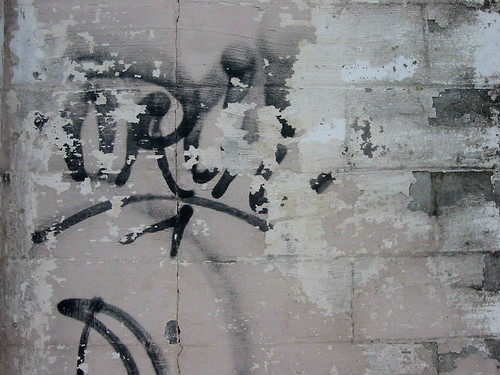
A Wall (Peeling Project)
In The Grand Piano 5, Barrett Watten examines friendship—“a necessary entailment of the art”—of all things, with all the theoretical artillery another’d point at, say, the theory of poetry as a faculty of expression. So that: after claiming some impact’d amount of time “spent attending to the details of friendship” (an odd, rather unnatural way to put it, a kind of “work”), he leaps into the (apparently less discomforting) void that allows talk like:
Two options result that one ought to avoid: to maintain coherence of self in denial of the other’s assault by projecting a totalizing unity outward, or to link identity with the other by reducing it to an element of the same. . . . An alternative, less controlling defense, more open to preserving the difference of what confronted one to begin with, would be to transform elements of alterity into a chain of identity that spreads outward and beyond.Uh, I suppose. I suppose that’d go better in the human world than, say, an overweening desire simply to remain a “thinking stone.” Or the pushing of one’s mug into every stray passers-by’s physiognomy to growl out a “Fat! Fat! Fat! Fat! I am the personal.” Watten’s formula of attending to friendship as a “constant contact with the exteriority of being” comes complete with poetickal epigraph (“Walls break off / where I am met”). And that’s a curious “construction”—a kind of “passively for thee I await” or “think of the fun / if only you come to me.” Friendship as a territory (to be) penetrated, friendship as the beckonings of a tourist brochure for, oh, Jamaica?
Truth is, Watten prefers to talk about the “politics” of friendship, or—in the bland faintest wash (if posed against the world itself) of hand-me-down theory-speak—its “ethics” (“an alternative ethics—that sees the other as an unsettling moment of the self, rather than disavowing it in an overarching category as identity. This is neither nonidentity nor equivalence but an active destabilizing of the other as oneself. I could write a book about it . . .”) Please, no. Nothing’s so unfriendly as dogged empty prose. It is, apparently, a Watten poetic:
In my own work, I was increasingly interested in an effect suggested by, but different from, such elusive language [he’s talking about “excessively private” “materials”]: a nonsignifying, hybrid neutrality that could not be traced back to intention. I wanted sentences that would float in their nonsignification, that would be authorless, iterative, and language-centered. As well, they would be flat, with as little affect or emotional quality as possible.Charming. “Authorless,” and full of authority. Also, petulant (“anyway, we were never friends”), defensive (“my appreciation is entirely voluntary”), bloat’d (“Nothing less that the entire relation of oneself to one’s friends—the fate of aesthetic community—was at stake”). Yow. (That last comment coming after the extraordinary remark that “Ray DiPalma artlessly forgot the conditions of friendship in his aesthetic community when he publicly accused its editors of stealing the logo of L=A=N=G=U=A=G=E from him.” Watten seems to think that an aesthetic community’s “art,” in order it not be “suspect,” must not “trade on private judgment to regulate communities of taste.” Remarkable. And, more remarkably, en même temps he derides “Pound’s misconstrual of friendship as the fascism of an artist’s republic” and deems the pathos of the late Avedon photograph of Pound and Williams—“after years and much disagreement, even revulsion” between the two—“corrupt.”)
The piece is not entirely grim (begrimed) with dull specs on the “conditions” of friendship. I did find a spark of amusement in Watten’s report that the cover illustration used for Plasma / Parallels / “X”—“a small, meticulously executed watercolor collage of reordered modular swashes of sepia”—now sits “unobtrusively” on Watten’s “theory shelf.” “Theory shelf,” badabing. Good one. Why that makes me think of Frank O’Hara’s (with friend Larry Rivers) fine instruction (“How to Proceed in the Arts,” c. 1961) I do not know:
Do you feel that you are busy enough? Truly busy. If you have had time to think, this will not be a good painting. Try reversing all the relationships. This will tend to make holes where there were hills. At least that will be amusing, and amusement is the dawn of Genius.
